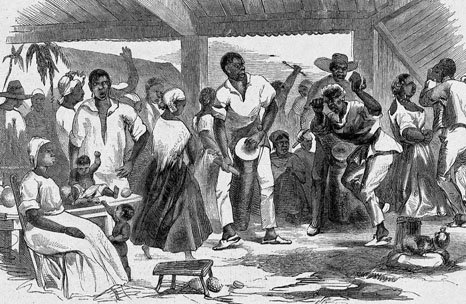Folk music and negro spirituals are examples of two unforeseen outcomes of slavery. They embody the experiences slaves faced in their day to day lives and expressed their desire for freedom.

As custom in Africa, slaves incorporated music into their activities. It was common for slaves to have work songs, children’s game songs, Creole songs, and protest songs. Instruments were prohibited so slaves improvised by using dance and a practice known as patting juba, body percussion, to accompany their singing. In order to adapt to their new surroundings, Africans watched the customs of Englishmen and added their own culture, a culture that has been mimicked and replicated throughout history. This acculturation created new genres in music and a form of comfort for slaves in their toughest times. These genres became known as folk music and negro spirituals. An exact date for the creation of these musical styles is not known, however, it is clear that they originated from African Americans in the United States.
Negro Spirituals served as a template for not only folk music, but also blues, gospel, and jazz. Culture also played an important role in their development. Folk music and negro spirituals are made up of many elements. They are a combination of polyrhythms, repeated choruses, and a style known as call-response in which a leader, either a singer or an instrument, make a statement that is followed by a response. A style that would reappear in African American music down the road. A well-known artist who acted as a spokesperson for this music was Paul Robeson. He was an all-around success in academics, art, athletics, and activism. He traveled the world and sang negro spirituals in order to spread the culture and spread a message of peace by speaking against racism.
Folk music and negro spirituals gave slaves an identity of their own. It was a belief during the time that African Americans lacked the characteristics that made them human. Music is proof that this belief is far from the truth. It is evident through these songs that slaves were humans, humans who had emotions and a culture of their own. This attempt to dehumanize slaves was meant to make them seem mechanical, but folk music and negro spirituals humanize and empower them. Slaves at the time had no idea that their music could have played a role in establishing their freedom. A book entitled Slave Songs in the United States, which was comprised of spirituals written by slaves is an example of how abolitionist tried to get the world to see their wrongdoings in continuing to allow slavery in the United States. Slaves were not compensated for the creation of this book, but it did become a valuable form of documentation of culture that was often overlooked during the time.

